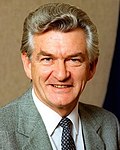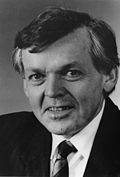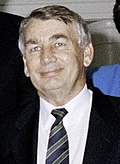Second Hawke ministry | |
|---|---|
| 55th Ministry of Australia | |
Bob Hawke Lionel Bowen | |
| Date formed | 13 December 1984 |
| Date dissolved | 24 July 1987 |
| People and organisations | |
| Monarch | Elizabeth II |
| Governor-General | Sir Ninian Stephen |
| Prime Minister | Bob Hawke |
| Deputy Prime Minister | Lionel Bowen |
| No. of ministers | 28 |
| Member party | Labor |
| Status in legislature | Majority government |
| Opposition party | Liberal–National coalition |
| Opposition leader | Andrew Peacock John Howard |
| History | |
| Election | 1 December 1984 |
| Outgoing election | 11 July 1987 |
| Legislature term | 34th |
| Predecessor | First Hawke ministry |
| Successor | Third Hawke ministry |
| ||
|---|---|---|
Term of government (1983–1991)
Ministries Elections | ||
The second Hawke ministry (Labor) was the 55th ministry of the Government of Australia. It was led by the country's 23rd Prime Minister, Bob Hawke. The second Hawke ministry succeeded the first Hawke ministry, which dissolved on 13 December 1984 following the federal election that took place on 1 December. The ministry was replaced by the third Hawke ministry on 24 July 1987 following the 1987 federal election. [1]






























